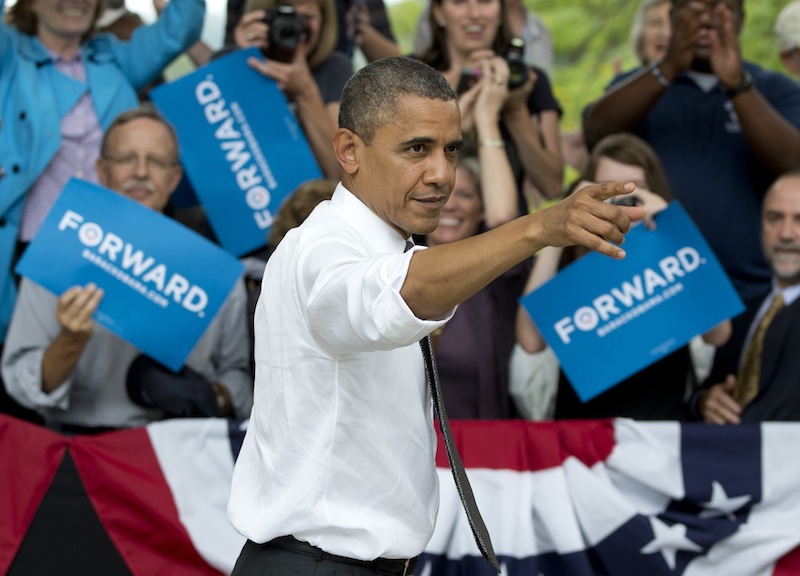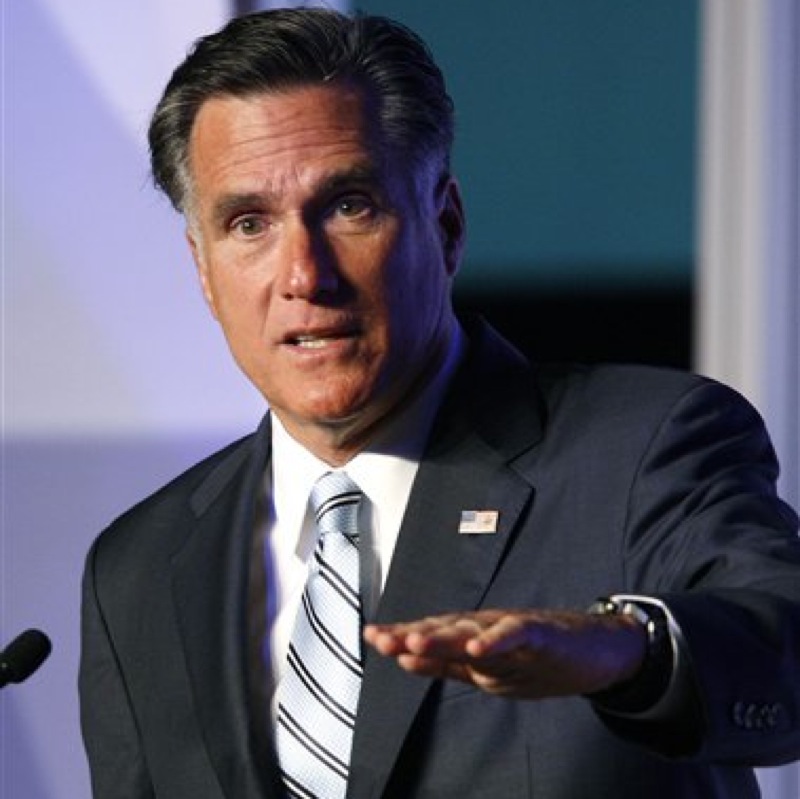CINCINNATI — President Barack Obama lodged an unfair-trade complaint against China Monday and immediately used it as a wedge against Republican challenger Mitt Romney, whose beleaguered campaign hit another pothole — in the form of private remarks made to donors — just as it was trying to reassure anxious supporters.
Obama told voters in Ohio, where the auto industry is important, of his administration’s new push for the World Trade Organization to sanction China for subsidizing exports of vehicles and auto parts — and costing American jobs.
Romney responded quickly and dismissively. Obama “may think that announcing new trade cases less than two months from Election Day will distract from his record, but the American businesses and workers struggling on an uneven playing field know better,” the Republican said.
Referring to his own criticism of Obama, he said, “If I’d known all it took to get him to take action was to run an ad citing his inaction on China’s cheating, I would have run one long ago.”
It was Romney’s own campaign, however, that preoccupied many GOP activists around the country Monday. Just as aides were trying to calm unhappy supporters, a video surfaced showing Romney telling wealthy donors that almost half of all Americans “believe they are victims” entitled to extensive government support.
“I’ll never convince them they should take personal responsibility and care for their lives,” he tells the donors.
Romney was referring to the 46 percent of Americans who do not owe federal income taxes; he put the figure at 47 percent in his videotaped remarks. Many of those Americans pay other forms of taxes. While many such households are poor, some families making $100,000 a year or more pay no federal income tax because of various deductions and credits.
Obama’s campaign manager, Jim Messina, called Romney’s comments “shocking.” An Obama adviser, who was not authorized to discuss campaign strategy publicly and requested anonymity, said the Democratic campaign might use Romney’s comments from the fundraising video in television spots.
In response to the video, the Romney campaign said, “Mitt Romney wants to help all Americans struggling in the Obama economy.”
Hours before the video was reported by Mother Jones magazine, Romney allies tried to dampen growing complaints that the campaign fumbled opportunities at its August convention, on foreign unrest and, most crucially, on the U.S. economy, which is seen as Obama’s weakest point.
Campaign adviser Ed Gillespie, in a conference call with reporters, said voters want more details about Romney’s tax and spending proposals, and he promised they will come.
“We’re not rolling out new policies,” Gillespie said, but the campaign wants people to “understand when we say we can do these things, here’s how we’re going to get them done, and these are the specifics.”
Obama, however, continued to taunt Romney for gaps in his deficit-cutting promises. It wasn’t immediately clear when Romney might start offering more specifics.
Deficit hawks have long urged politicians of all stripes to tell voters the painful truth that services must be cut and/or taxes must be raised to slow federal deficit spending.
Romney addressed another sensitive area Monday, immigration, in his speech to the U.S. Hispanic Chamber of Commerce in Los Angeles.
He pledged to work with both parties to “permanently fix our immigration system.” He said a fair and efficient system would never be achieved “if we do not first get control of our borders.”
The careful language underscored the fine line Romney must walk between appealing to Latino voters and angering conservatives who oppose proposals for pathways to citizenship for some illegal immigrants.
Republican activists have watched with growing concern as opinion polls suggest Obama has opened a small lead over Romney since the parties’ late-summer conventions. Some conservative writers have complained for months that Romney needs to put more details behind his pledges to tame the deficit while also preserving all tax cuts and expanding military spending. Others say Romney mishandled a chance to criticize Obama’s foreign policy last week when the Republican nominee issued sharp remarks in the opening hours of fast-changing and complicated episodes of violence aimed at American facilities in the Middle East.
On Sunday, Politico reported significant tension and disarray in the Romney campaign. Particularly chaotic, according to the account, were efforts to draft Romney’s acceptance speech at the Tampa, Fla., convention. The speech drew lackluster reviews in general, and rebukes from some for making no mention of U.S. troops in Afghanistan and Iraq.
Romney played down the reports in an interview with Telemundo. “I’ve got a terrific campaign,” he said. “My senior campaign people work extraordinarily well together. I work well with them.”
With 50 days until the election, Romney’s camp unveiled new TV ads and planned a renewed focus on policy in campaign appearances by the nominee, his running mate, Rep. Paul Ryan, and top surrogates.
Obama, speaking in Cincinnati soon after Gillespie’s conference call, seemed eager to challenge the notion that Romney will detail potentially painful changes Americans will have to accept to slow the fast rise in the federal debt.
Obama own spending plans would not balance the budget. But he has offered more detailed tax-and-spending proposals, in part because he must present budget proposals to Congress. In Ohio on Monday, Obama noted that he, unlike Romney, would raise taxes on households making more than $250,000 a year. Romney’s platform, the president said, “doesn’t add up.”
“They say the most important thing we have to do is reduce the deficit,” Obama said. “Then the first thing they do is to spend trillions of dollars more on tax breaks for the wealthy.”
“And whenever you ask them to explain the plan, they won’t,” he said. “They won’t say how they pay for $5 trillion in tax cuts.”
In his Los Angeles speech, Romney added no new significant details to his deficit-cutting claims. He said he would put the nation “on track to a balanced budget,” in part by eliminating non-essential programs or subsidies. The only subsidies he specified go to Amtrak, the Corporation for Public Broadcasting, the national endowments for the arts and humanities, and the Legal Services Corporation.
These programs, which Romney has targeted since 2011, receive a tiny portion of federal spending.
Several balanced-budget advocates want both Romney and Obama to confront tougher decisions about spending and taxes. Former Clinton White House Chief of Staff Erskine Bowles, who co-chaired a deficit-reduction commission, told NBC Sunday that the presidential campaigns contain “not nearly enough substance” on this topic.
“There’s no easy way out,” Bowles said, “and I think the candidates are afraid to stand up and say, ‘Look, we need to make some tough choices. We need to have some shared sacrifice.'”
In Cincinnati, Obama reiterated his claims that Bain Capital — the private equity firm Romney headed for years — helped companies shift U.S. jobs to China.
“He made money investing in companies that uprooted from here and went to China,” the president said. “When other countries don’t play by the rules, we’ve done something about it. We’ve brought more trade cases against China in one term than the previous administration did in two.”
Romney’s campaign recently began airing TV ads accusing Obama of allowing American manufacturing jobs to be lost to China. The campaign says Bain was not involved in moving jobs to China while Romney headed the firm.
Separately, China filed its own World Trade Organization case Monday challenging U.S. anti-dumping measures on billions of dollars of kitchen appliances, paper and other goods, adding to worsening trade strains between the two economic giants.
Send questions/comments to the editors.




Comments are no longer available on this story